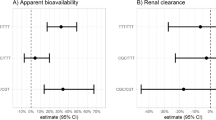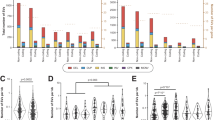Abstract
Multidrug resistance protein 2 (MRP2, ABCC2) is an efflux membrane transporter highly expressed in liver, kidney and intestine with important physiological and pharmacological roles. The goal of this study was to investigate the functional significance of promoter region polymorphisms in ABCC2 and potential allele-specific expression. Twelve polymorphisms in the 1.6 kb region upstream of the translation start site were identified by resequencing 247 DNA samples from ethnically diverse individuals. Luciferase reporter gene assays showed that ABCC2 −24C>T both alone and as part of a common haplotype (−24C>T/−1019A>G/−1549G>A) increased promoter function 35% compared with the reference sequence (P<0.0001). No other common variants or haplotypes affected ABCC2 promoter activity. Allele-specific expression was also investigated as a mechanism to explain reported associations of the synonymous ABCC2 3972C>T variant with pharmacokinetic phenotypes. In Caucasian liver samples (n=41) heterozygous for the 3972C>T polymorphism, the 3972C allele was preferentially transcribed relative to the 3972T allele (P<0.0001). This allelic imbalance was particularly apparent in samples with haplotypes containing two or three promoter/untranslated region variants (−1549G>A, −1019A>G and −24C>T). The observed allelic imbalance was not associated with hepatic or renal ABCC2 mRNA expression. Additional mechanisms will need to be explored to account for the interindividual variation in ABCC2 expression and MRP2 function.
This is a preview of subscription content, access via your institution
Access options
Subscribe to this journal
Receive 6 print issues and online access
$259.00 per year
only $43.17 per issue
Buy this article
- Purchase on Springer Link
- Instant access to full article PDF
Prices may be subject to local taxes which are calculated during checkout



Similar content being viewed by others

References
Paulusma CC, Oude Elferink RP . The canalicular multispecific organic anion transporter and conjugated hyperbilirubinemia in rat and man. J Mol Med 1997; 75: 420–428.
Buchler M, Konig J, Brom M, Kartenbeck J, Spring H, Horie T et al. cDNA cloning of the hepatocyte canalicular isoform of the multidrug resistance protein, cMrp, reveals a novel conjugate export pump deficient in hyperbilirubinemic mutant rats. J Biol Chem 1996; 271: 15091–15098.
Dietrich CG, Ottenhoff R, de Waart DR, Oude Elferink RP . Role of MRP2 and GSH in intrahepatic cycling of toxins. Toxicology 2001; 167: 73–81.
Evers R, de Haas M, Sparidans R, Beijnen J, Wielinga PR, Lankelma J et al. Vinblastine and sulfinpyrazone export by the multidrug resistance protein MRP2 is associated with glutathione export. Br J Cancer 2000; 83: 375–383.
Nies AT, Keppler D . The apical conjugate efflux pump ABCC2 (MRP2). Pflugers Arch 2007; 453: 643–659.
Jemnitz K, Heredi-Szabo K, Janossy J, Ioja E, Vereczkey L, Krajcsi P . ABCC2/Abcc2: a multispecific transporter with dominant excretory functions. Drug Metab Rev 2010; 42: 402–436.
Toh S, Wada M, Uchiumi T, Inokuchi A, Makino Y, Horie Y et al. Genomic structure of the canalicular multispecific organic anion-transporter gene (MRP2/cMOAT) and mutations in the ATP-binding-cassette region in Dubin-Johnson syndrome. Am J Hum Genet 1999; 64: 739–746.
Anderson PL, Lamba J, Aquilante CL, Schuetz E, Fletcher CV . Pharmacogenetic characteristics of indinavir, zidovudine, and lamivudine therapy in HIV-infected adults: a pilot study. J Acquir Immune Defic Syndr 2006; 42: 441–449.
Haenisch S, May K, Wegner D, Caliebe A, Cascorbi I, Siegmund W . Influence of genetic polymorphisms on intestinal expression and rifampicin-type induction of ABCC2 and on bioavailability of talinolol. Pharmacogenet Genomics 2008; 18: 357–365.
Haenisch S, Zimmermann U, Dazert E, Wruck CJ, Dazert P, Siegmund W et al. Influence of polymorphisms of ABCB1 and ABCC2 on mRNA and protein expression in normal and cancerous kidney cortex. Pharmacogenomics J 2007; 7: 56–65.
Hirouchi M, Suzuki H, Itoda M, Ozawa S, Sawada J, Ieiri I et al. Characterization of the cellular localization, expression level, and function of SNP variants of MRP2/ABCC2. Pharm Res 2004; 21: 742–748.
Meier Y, Pauli-Magnus C, Zanger UM, Klein K, Schaeffeler E, Nussler AK et al. Interindividual variability of canalicular ATP-binding-cassette (ABC)-transporter expression in human liver. Hepatology 2006; 44: 62–74.
Ranganathan P, Culverhouse R, Marsh S, Mody A, Scott-Horton TJ, Brasington R et al. Methotrexate (MTX) pathway gene polymorphisms and their effects on MTX toxicity in Caucasian and African American patients with rheumatoid arthritis. J Rheumatol 2008; 35: 572–579.
Izzedine H, Hulot JS, Villard E, Goyenvalle C, Dominguez S, Ghosn J et al. Association between ABCC2 gene haplotypes and tenofovir-induced proximal tubulopathy. J Infect Dis 2006; 194: 1481–1491.
Wojnowski L, Kulle B, Schirmer M, Schluter G, Schmidt A, Rosenberger A et al. NAD(P)H oxidase and multidrug resistance protein genetic polymorphisms are associated with doxorubicin-induced cardiotoxicity. Circulation 2005; 112: 3754–3762.
Stockel B, Konig J, Nies AT, Cui Y, Brom M, Keppler D . Characterization of the 5′-flanking region of the human multidrug resistance protein 2 (MRP2) gene and its regulation in comparison with the multidrug resistance protein 3 (MRP3) gene. Eur J Biochem 2000; 267: 1347–1358.
Tanaka T, Uchiumi T, Hinoshita E, Inokuchi A, Toh S, Wada M et al. The human multidrug resistance protein 2 gene: functional characterization of the 5′-flanking region and expression in hepatic cells. Hepatology 1999; 30: 1507–1512.
Qadri I, Hu LJ, Iwahashi M, Al-Zuabi S, Quattrochi LC, Simon FR . Interaction of hepatocyte nuclear factors in transcriptional regulation of tissue specific hormonal expression of human multidrug resistance-associated protein 2 (abcc2). Toxicol Appl Pharmacol 2009; 234: 281–292.
Naesens M, Kuypers DR, Verbeke K, Vanrenterghem Y . Multidrug resistance protein 2 genetic polymorphisms influence mycophenolic acid exposure in renal allograft recipients. Transplantation 2006; 82: 1074–1084.
Choi JH, Ahn BM, Yi J, Lee JH, Nam SW, Chon CY et al. MRP2 haplotypes confer differential susceptibility to toxic liver injury. Pharmacogenet Genomics 2007; 17: 403–415.
Daly AK, Aithal GP, Leathart JB, Swainsbury RA, Dang TS, Day CP . Genetic susceptibility to diclofenac-induced hepatotoxicity: contribution of UGT2B7, CYP2C8, and ABCC2 genotypes. Gastroenterology 2007; 132: 272–281.
Fujita K, Nagashima F, Yamamoto W, Endo H, Sunakawa Y, Yamashita K et al. Association of ATP-binding cassette, sub-family C, number 2 (ABCC2) genotype with pharmacokinetics of irinotecan in Japanese patients with metastatic colorectal cancer treated with irinotecan plus infusional 5-fluorouracil/leucovorin (FOLFIRI). Biol Pharm Bull 2008; 31: 2137–2142.
Moriya Y, Nakamura T, Horinouchi M, Sakaeda T, Tamura T, Aoyama N et al. Effects of polymorphisms of MDR1, MRP1, and MRP2 genes on their mRNA expression levels in duodenal enterocytes of healthy Japanese subjects. Biol Pharm Bull 2002; 25: 1356–1359.
Han JY, Lim HS, Yoo YK, Shin ES, Park YH, Lee SY et al. Associations of ABCB1, ABCC2, and ABCG2 polymorphisms with irinotecan-pharmacokinetics and clinical outcome in patients with advanced non-small cell lung cancer. Cancer 2007; 110: 138–147.
Miura M, Satoh S, Inoue K, Kagaya H, Saito M, Inoue T et al. Influence of SLCO1B1, 1B3, 2B1 and ABCC2 genetic polymorphisms on mycophenolic acid pharmacokinetics in Japanese renal transplant recipients. Eur J Clin Pharmacol 2007; 63: 1161–1169.
Innocenti F, Ratain MJ . Pharmacogenetics of irinotecan: clinical perspectives on the utility of genotyping. Pharmacogenomics 2006; 7: 1211–1221.
Kroetz DL . Role for drug transporters beyond tumor resistance: hepatic functional imaging and genotyping of multidrug resistance transporters for the prediction of irinotecan toxicity. J Clin Oncol 2006; 24: 4225–4227.
Zamboni WC, Ramanathan RK, McLeod HL, Mani S, Potter DM, Strychor S et al. Disposition of 9-nitrocamptothecin and its 9-aminocamptothecin metabolite in relation to ABC transporter genotypes. Invest New Drugs 2006; 24: 393–401.
Innocenti F, Kroetz DL, Schuetz E, Dolan ME, Ramirez J, Relling M et al. Comprehensive pharmacogenetic analysis of irinotecan neutropenia and pharmacokinetics. J Clin Oncol 2009; 27: 2604–2614.
Hoblinger A, Grunhage F, Sauerbruch T, Lammert F . Association of the c.3972C>T variant of the multidrug resistance-associated protein 2 Gene (MRP2/ABCC2) with susceptibility to bile duct cancer. Digestion 2009; 80: 36–39.
Han B, Gao G, Wu W, Gao Z, Zhao X, Li L et al. Association of ABCC2 polymorphisms with platinum-based chemotherapy response and severe toxicity in non-small cell lung cancer patients. Lung Cancer 2011; 72: 238–243.
Leabman MK, Huang CC, DeYoung J, Carlson EJ, Taylor TR, de la Cruz M et al. Natural variation in human membrane transporter genes reveals evolutionary and functional constraints. Proc Natl Acad Sci USA 2003; 100: 5896–5901.
Latif S, Bauer-Sardina I, Ranade K, Livak KJ, Kwok PY . Fluorescence polarization in homogeneous nucleic acid analysis II: 5′-nuclease assay. Genome Res 2001; 11: 436–440.
de Jong FA, Scott-Horton TJ, Kroetz DL, McLeod HL, Friberg LE, Mathijssen RH et al. Irinotecan-induced diarrhea: functional significance of the polymorphic ABCC2 transporter protein. Clin Pharmacol Ther 2007; 81: 42–49.
Laechelt S, Turrini E, Ruehmkorf A, Siegmund W, Cascorbi I, Haenisch S . Impact of ABCC2 haplotypes on transcriptional and posttranscriptional gene regulation and function. Pharmacogenomics J 2011; 11: 25–34.
Ufer M, Mosyagin I, Muhle H, Jacobsen T, Haenisch S, Hasler R et al. Non-response to antiepileptic pharmacotherapy is associated with the ABCC2 −24C>T polymorphism in young and adult patients with epilepsy. Pharmacogenet Genomics 2009; 19: 353–362.
Nishioka C, Sakaeda T, Nakamura T, Moriya Y, Okamura N, Tamura T et al. MDR1, MRP1 and MRP2 genotypes and in vitro chemosensitivity in Japanese patients with colorectal adenocarcinomas. Kobe J Med Sci 2004; 50: 181–188.
Meyer zu Schwabedissen HE, Jedlitschky G, Gratz M, Haenisch S, Linnemann K, Fusch C et al. Variable expression of MRP2 (ABCC2) in human placenta: influence of gestational age and cellular differentiation. Drug Metab Dispos 2005; 33: 896–904.
Hilger E, Reinthaler EM, Stogmann E, Hotzy C, Pataraia E, Baumgartner C et al. Lack of association between ABCC2 gene variants and treatment response in epilepsy. Pharmacogenomics 2012; 13: 185–190.
Acknowledgements
This work was supported by NIH Grants GM61390, GM61393, GM92666 and CA21765. TDN and JMG were supported in part by NIH Training Grant T32 GM007175.
Author information
Authors and Affiliations
Corresponding author
Ethics declarations
Competing interests
The authors declare no conflict of interest.
Additional information
Supplementary Information accompanies the paper on The Pharmacogenomics Journal website
Supplementary information
Rights and permissions
About this article
Cite this article
Nguyen, T., Markova, S., Liu, W. et al. Functional characterization of ABCC2 promoter polymorphisms and allele-specific expression. Pharmacogenomics J 13, 396–402 (2013). https://doi.org/10.1038/tpj.2012.20
Received:
Revised:
Accepted:
Published:
Issue Date:
DOI: https://doi.org/10.1038/tpj.2012.20
Keywords
This article is cited by
-
Elevation of alkaline phosphatase and long-term drug therapy for cystic fibrosis
European Journal of Clinical Pharmacology (2022)
-
Sex-Related Differences in Impact on Safety of Pharmacogenetic Profile for Colon Cancer Patients Treated with FOLFOX-4 or XELOX Adjuvant Chemotherapy
Scientific Reports (2019)
-
Clinical validity of new genetic biomarkers of irinotecan neutropenia: an independent replication study
The Pharmacogenomics Journal (2016)
-
Allele-specific expression of mutated in colorectal cancer (MCC) gene and alternative susceptibility to colorectal cancer in schizophrenia
Scientific Reports (2016)


